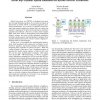Free Online Productivity Tools
i2Speak
i2Symbol
i2OCR
iTex2Img
iWeb2Print
iWeb2Shot
i2Type
iPdf2Split
iPdf2Merge
i2Bopomofo
i2Arabic
i2Style
i2Image
i2PDF
iLatex2Rtf
Sci2ools
ISCA
2012
IEEE
2012
IEEE
BlockChop: Dynamic squash elimination for hybrid processor architecture
Hybrid processors are HW/SW co-designed processors that leverage blocked-execution, the execution of regions of instructions as atomic blocks, to facilitate aggressive speculative optimization. As we move to a multicore hybrid design, fine grained conflicts for shared data can violate the atomicity requirement of these blocks and lead to expensive squashes and rollbacks. However, as these atomic regions differ from those used in checkpointing and transactional memory systems, the extent of this potentially prohibitive problem remains unclear, and mechanisms to mitigate these squashes dynamically may be critical to enable a highly performant multicore hybrid design. In this work, we investigate how multithreaded applications, both benchmark and commercial workloads, are affected by squashes, and present dynamic mechanisms for mitigating these squashes in hybrid processors. While the current wisdom is that there is not a significant number of squashes for smaller atomic regions, we o...
| Added | 28 Sep 2012 |
| Updated | 28 Sep 2012 |
| Type | Journal |
| Year | 2012 |
| Where | ISCA |
| Authors | Jason Mars, Naveen Kumar |
Comments (0)

